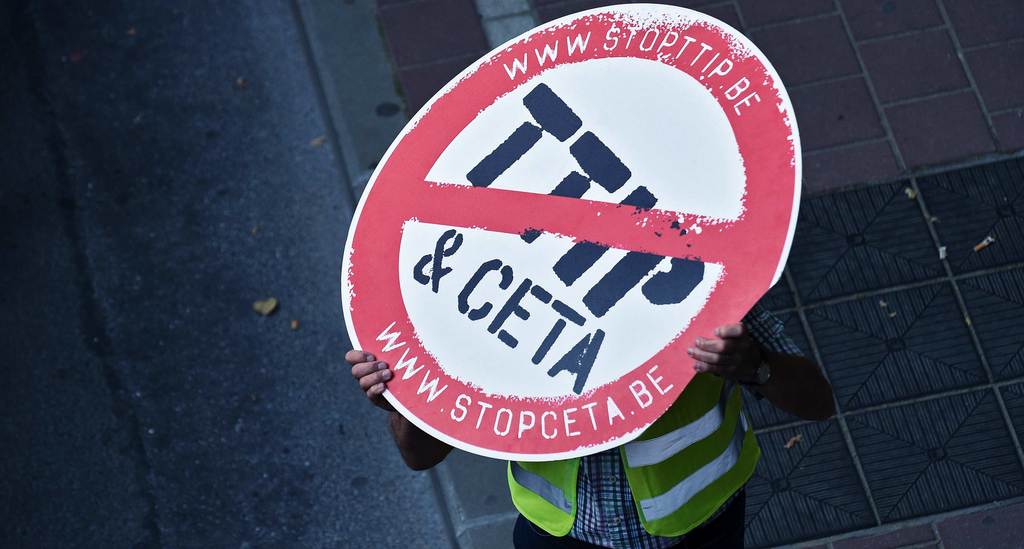If you’ve followed the news, you’ll know that both the Transatlantic Trade and Investment Partnership (TTIP), negotiated between the European Union and the United States, and the Comprehensive Economic and Trade Agreement (CETA), between the EU and Canada, are facing a massive popular backlash across Europe.
According to a YouGov poll, only 17 per cent of Germans believe that TTIP is a good thing (the figure is 26 per cent on Eurobarometer). As for CETA, more than 190,000 petitioners challenged the deal in Germany’s constitutional court, which finally gave the green light to the deal earlier this month – only for the Walloons in Belgium to deliver a probable death blow to it anyway.
Does this mean that Europe has turned against free trade once and for all?
Fortunately, upon closer inspection, this backlash may have shallower roots than is generally imagined. Polls show, for example, that most EU citizens still support TTIP, in some countries by very large margins. In total, 67 percent of Danes, 69 percent of Swedes, 70 percent of the Irish and 77 percent of Lithuanians are in favour.
Support has indeed plummeted in Germany and Austria – but in both countries, the agreements have been targeted by well-organised disinformation campaigns, largely focusing on the investor-state dispute settlement (ISDS) mechanism by which companies can seek redress if the deals’ obligations are not honoured.
These campaigns are run by a network of organisations, but these organisations can themselves be traced back to a surprisingly small number of political groups. In the public consultation set up by the European Commission, 97 percent of the 150,000 critical submissions received were prefabricated by these organisations.
“When in Germany someone Googles ‘TTIP’,” reports Matthias Bauer, an economist with the Brussels-based European Centre for International Political Economy, “they land on a sponsored link on the Greens’ position on TTIP and CETA, placed at the top in the search results. That’s followed by commercial advertisements about TTIP from the Umweltinstitut in Munich [an environmentalist group, traditionally opposed to nuclear energy], Foodwatch, and Greenpeace.”
A significant nexus for anti-TTIP and anti-CETA campaigning is “Campact Germany”, an online petitions, fundraising and campaigning site. It spends roughly half of its campaign budget lobbying against both. According to Bauer, €250,000 went from Campact to Naturfreunde Germany, which has links to the Marxist Forum of Germany’s far-left populist party, Die Linke, itself known for its cosy relationship with the Kremlin. (It is telling that Russian propaganda outlets are standing firmly on the side of TTIP and CETA’s opponents.)
The Greens joined the anti-TTIP bandwagon after their poor performance in the 2013 election. They were followed by some members of the Social Democrats (SPD), including the party leader Sigmar Gabriel, who claimed that TTIP talks had failed.
For anti-globalisation campaigners, both TTIP and CETA have been a massive financial boon: last year, for example, Campact received donations worth €7 million, or three times what they received in 2012. Campaigners have even been able to use funding from the European Commission and the German federal budget.
Of course, there’s nothing wrong with civil society organizations campaigning for or against trade agreements. What makes the current situation disturbing is the one-sided and post-factual nature of the conversation.
In a way that is highly reminiscent of Russian propaganda – and of Donald Trump’s presidential campaign – the anti-TTIP and anti-CETA activists are extremely casual with facts.
“[O]ur plates are to be filled with GMOs, chlorinated poultry or meat from cloned animals, beef injected with hormones,” Europeans are warned. Yet neither TTIP nor CETA will mean overturning the EU’s bans on GMOs or hormone-fed beef. CETA, furthermore, contains no provisions on trade in poultry and eggs. (In Britain, campaigners have claimed that TTIP means the privatisation of the NHS, despite explicit government denials.)
More broadly, it is simply not true that the United States has systematically less stringent environmental, health or food safety standards than the EU. America has actually been more successful in limiting food-borne illness rates (e.g. campylobacteriosis or listeriosis), has considerably tougher nitrogen oxide pollution standards, and bans as unsafe a range of medical devices still used in the EU.
What should the response be to concerted efforts to scare the European public into opposing free trade? Within Germany, business associations shy away from campaigning for the agreements. Nor are Germany’s centre-right parties trying to pierce through the anti-trade narrative.
Some, such as Wolfgang Münchau of the Financial Times, suggest that policymakers should just give up: “These agreements are a focus for anti-globalisation protests,” he wrote recently. “After Brexit, this is not the best time for Europe’s liberal elites to double down.”
But there might be substantial economic costs to letting these agreements go. The EU-Canada deal, for example, would have added an extra £1.3 billion to Britain’s economy alone, every year.
More fundamentally, resignation is never the right answer to a one-sided flurry of lies and disinformation – especially if those endanger the foundations of economic prosperity in the North Atlantic.
Now more than ever, advocates of free trade in politics, academia and think tanks need to stand up for their cause.


